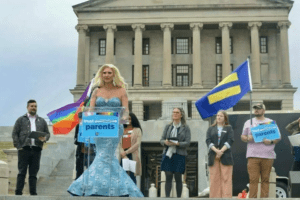Drag Bans: A Violation of the First Amendment?
April 26, 2023 by

Last month, Tennessee Governor Bill Lee signed a first-of-its-kind law banning “adult cabaret entertainment” on public property or in any location where people under 18 could be present.
Senate Bill 3, commonly known as the “drag ban,” in part defines these performances as “male or female impersonators who provide entertainment that appeals to a prurient interest, or similar entertainers.”1 The law calls for first-time offenders to be charged with misdemeanors with subsequent offenses classified as felonies that could result in prison sentences of up to six years. The Republican-controlled Tennessee Senate passed the ban into law on March 2 with the intention for it to go into effect on April 1. The law was halted by a federal judge hours before it was to go into effect using a temporary restraining order, citing constitutional protections of freedom of speech.2
The drag ban has become a national conversation, with opponents of the law criticizing it for targeting the LGBTQ+ community. It follows several other issues considered by Governor Lee over the last couple of months, including prohibiting transgender Tennesseans from changing the gender listed on their driver’s license and prohibiting referrals for children to receive gender-affirming care in the state.3 Those opposed to the law are concerned that it is too vague in its definitions of what constitutes a “drag” impersonation and how to discern a location where a minor may be present. Both the American Civil Liberties Union and the Human Rights Campaign have expressed concerns that the law gives too much power to law enforcement to interpret the drag ban as they choose and potentially target transgender and gender-nonconforming entertainers performing in public.4
Members of the drag community argue that drag performances are much like any other form of entertainment. They say that just as some movies or comedy shows are appropriate for children and some are not, there are drag performances made appropriate for children and performances intended for adults. Performers are worried that authorities will not bother to discern the difference or will abuse the law in an effort to ban all drag performances.
State Senate Majority Leader Jack Johnson, a sponsor of the drag ban bill, argued on Twitter, “The bill gives confidence to parents that they can take their kids to a public or private show and will not be blindsided by a sexualized performance.”5 He continued, “We’re protecting kids and families and parents who want to be able to take their kids to public places. We’re not attacking anyone or targeting anyone.”6 While his sentiments were supported by most Republican legislators, Judge Thomas Parker—who ordered the temporary halt on the Tennessee drag ban and a Republican himself—felt the law was an overreach of government authority.
Regina Lambert Hillman, a professor of law at the University of Memphis, assured that the ban cannot prevent transgender persons from dressing as they choose in public. She explained in an essay, “You still have First Amendment protections, what that means is how a person dresses or what a person says, that does not change. The government cannot suppress speech, including expressive conduct, just because they find it offensive or they don’t like the content.”7
Though this law is the first of its kind passed, 14 other states have introduced similar legislation this year. Experts see this legislation as a coming trend that will likely cause similar conversations about whether it’s a First Amendment violation, LGBTQ+ rights, and how a law like this could be enforced. Meanwhile, the courts will be tasked with determining whether such laws are constitutional.
READ the full bill summary here.
Discussion Questions
- Is it the responsibility of the government to censor entertainment for children, or should that responsibility be placed upon parents?
- How are different values, such as equality, liberty, and justice, at play here? What other values, such as tradition or order, might also be relevant?
- Would you support a law such as this in your state or community? Why or why not?
- Is this ban a violation of the First Amendment? Why or why not?
Other Resources
- Map of other LGBTQ+ related laws being considered and criticized by the ACLU.
- Reports by the Gay & Lesbian Alliance Against Defamation (GLAAD) on drag events in 2022 that were protested or threatened.
- Republicans Lawmakers Are Trying To Ban Drag. First They Have To Define It, from FiveThirtyEight.
Related Posts
- The Supreme Court Weighs the First Amendment and Minority Rights
- LGBTQ Youth: Who Decides What Is Age-Appropriate?
- Close Up Conversation (Video) LGBTQ Equality – Past, Present & the Election
As always, we encourage you to join the discussion with your comments or questions below.
Sources







